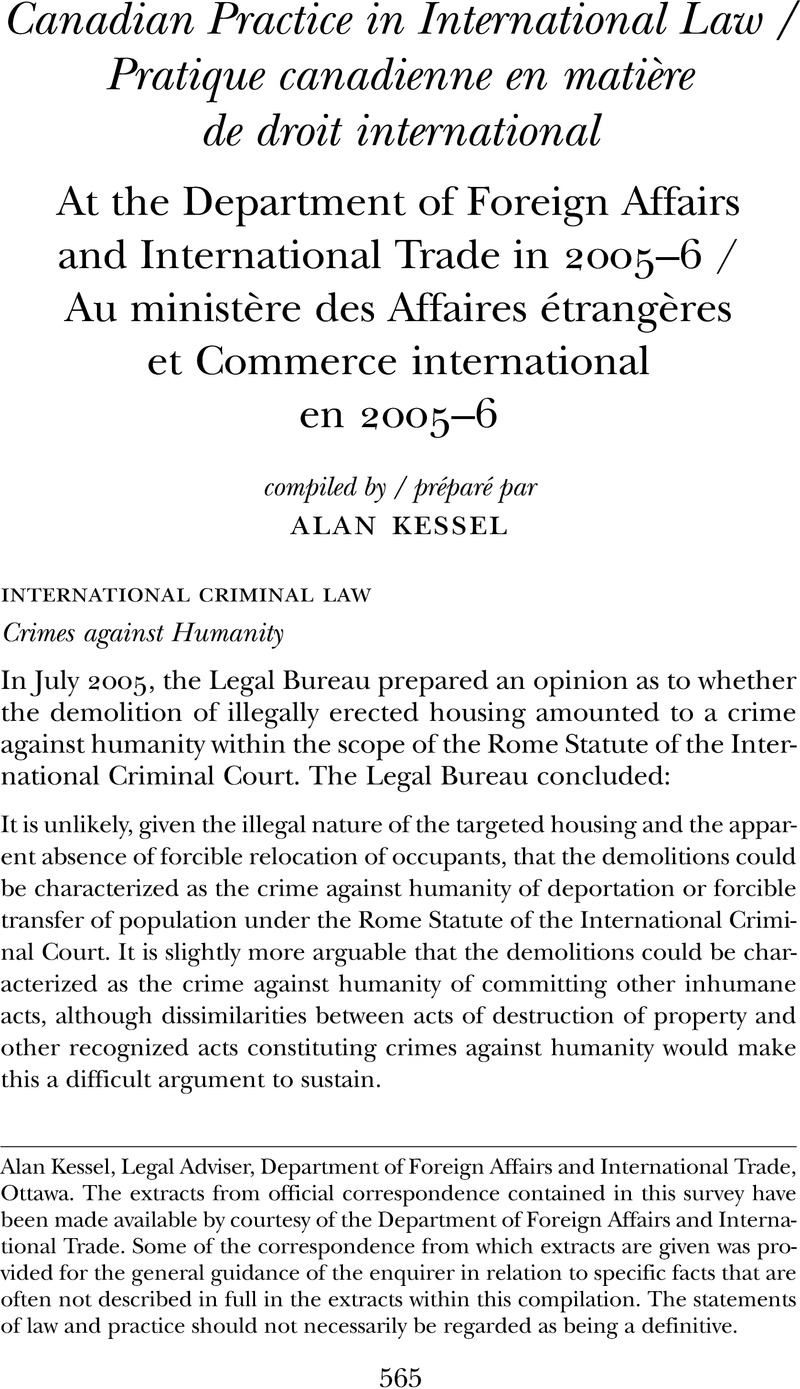No CrossRef data available.
Article contents
At the Department of Foreign Affairs and International Trade in 2005–6 / Au ministère des Affaires étrangères et Commerce international en 2005–6
Published online by Cambridge University Press: 09 March 2016
Abstract

- Type
- Canadian Practice in International Law / Pratique canadienne en matière de droit international
- Information
- Canadian Yearbook of International Law/Annuaire canadien de droit international , Volume 44 , 2007 , pp. 565 - 602
- Copyright
- Copyright © The Canadian Council on International Law / Conseil Canadien de Droit International, representing the Board of Editors, Canadian Yearbook of International Law / Comité de Rédaction, Annuaire Canadien de Droit International 2007
References
1 Fawcett, J. E. S., “The Legal Character of International Agreements” (1953) 30 B.Y.I.L. 381 at 385Google Scholar; and North Sea Continental Shelf Cases (Federal Republic of Germany v. Denmark; Federal Republic of Germany v. The Netherlands), [1969] I.C.J. Rep. 3. at para.28.
2 Reuter, P., Introduction to the Law of Treaties, trans. Mico, J. & Haggenmacher, P., 2nd edition (London: Kegan Paul International, 1995) at 59 Google Scholar; and Aegean Sea Continental Shelf Case, [1978] I.C.J. Rep. 3 at 39–43.
3 Even amendments of an institutional nature do not come into force for states parties until six months after their adoption at an ASP or review conference. See Article 122(2).
4 Informal Inter-Sessional Meeting of the Special Working Group on the Crime of Aggression, 13–15 June, 2005, Doc. ICC-ASP/4/SWGCA/INF.a (2005) at 5.
5 The ILC Articles on State Responsibility recognize that the treaty is the primary source for determining the state’s responsibility. Article 2 of the ILC Articles identifies two conditions that must be met in order for conduct to attract responsibility: it must be attributable to the state and must constitute the breach of an international obligation. Crawford, James, The International Law Commission’s Articles on State Responsibility, Introduction, Text and Commentaries (Cambridge: Cambridge University Press)Google Scholar [ILC Articles and Commentaries] (Investor’s Book of Authorities, Tab 3).
6 ILC Articles and Commentaries, supra note 5 at 74 (Investor’s Book of Authorities, Tab 3).
7 The lex specialis principle is reflected in Article 55 of the ILC Articles, supra note 5. The ILC Commentaries note: “Article 55 makes it clear by reference to the lex specialis principle that the articles have a residual character. Where some matter otherwise dealt with in the articles is governed by a special rule of international law, the latter will prevail to the extent of any inconsistency (at 306).” It comments: “Article 55 provides that the Articles do not apply where and to the extent that the conditions for the existence of an internationally wrongful act or its legal consequences are determined by special rules of international law.” It further notes: “For the lex specialis principle to apply it is not enough that the same subject matter is dealt with by two provisions; there must be some actual inconsistency between them, or else a discernible intention that one provision is to exclude the other. Thus the question is essentially one of interpretation (at 307).” (Investor’s Book of Authorities, Tab 3).
8 While there are some similarities between Articles 1502(3)(a) and 1503(2) and Article 5 of the ILC Articles, supra note 5, as the claimant notes in para. 472 of the investor’s reply, these rules are not identical. Moreover, to the extent the claimant argues that the rules of Article 4 of the ILC Articles are applicable, then the rules of Articles 1502 (3)(a) and 1503(2) of the NAFTA differ significantly.
9 To the extent that the rules of state responsibility are found to be relevant, Canada’s position remains that Canada Post is not a state organ as set out in Canada’s counter-memorial, paras. 792, 808. Canada Post is not part of the formal structure of government, it has legally distinct personality. Under the rules of state responsibility, this type of entity is considered to be a para-statal entity and its conduct only attributable to the state when it exercises governmental authority.
10 Please note that the arbitration tribunal released their decision to the parties on 11 June 2007. The decision rejected the claims of UPS as a whole. The decision is available at <http://www.international.gc.ca/tna-nac/gov-en.asp>.
11 There is no dispute between the parties that Article 11 of the DSU applies in this case. Article 17.6 of the AD Agreement also applies to the finding of threat of material injury in respect of the anti-dumping investigation. Both provisions require that a panel make an objective assessment of the facts and the matter as a whole. Because Canada’s appeal raises no issues requiring separate consideration under Article 17.6 of the AD Agreement, this submission refers exclusively to Article 11 of the DSU.
12 Argentina – Footwear (EC), at para. 122.
13 Chile – Price Band System, at para. 224; see also Canada – Autos, at para. 165.
14 US – Countervailing Duty Investigation on DRAMS, at para. 184.
15 US – Lamb, at para. 105.
16 US – Upland Cotton, at para. 663.
17 The Panel used its “not unreasonable” standard in paras. 7.19–7.22, 7.26–7.28, 7.35, 7.39, 7.42, 7.50–7.52, 7.55–7.57, 7.62–7.63, and 7.72–7.73.
18 Mexico – Corn Syrup (Article 21.5 – US), Appellate Body Report, at para. 100.
19 US – Line Pipe, at para. 169.
20 The Committee on Anti-Dumping Practices, Recommendation Concerning Determination of Threat of Material Injury, adopted by the Committee on 21 October 1985, GATT Doc. No. ADP/25, BISD 32S/182 (Exhibit CDA-12).
21 Mexico – Corn Syrup (Article 21.5 – US), Appellate Body Report, at para. 85.
22 Article 21.5 of the Panel Report, at para. 7.13.
23 Ibid., at paras. 7.28 and 7.50.
24 The panel in Mexico – Corn Syrup interpreted Article 3.7 to require the investigating authority to examine each of the factors specified under that article. Mexico – Corn Syrup, at paras. 7.124–7.127. This interpretation was not appealed to the Appellate Body.




